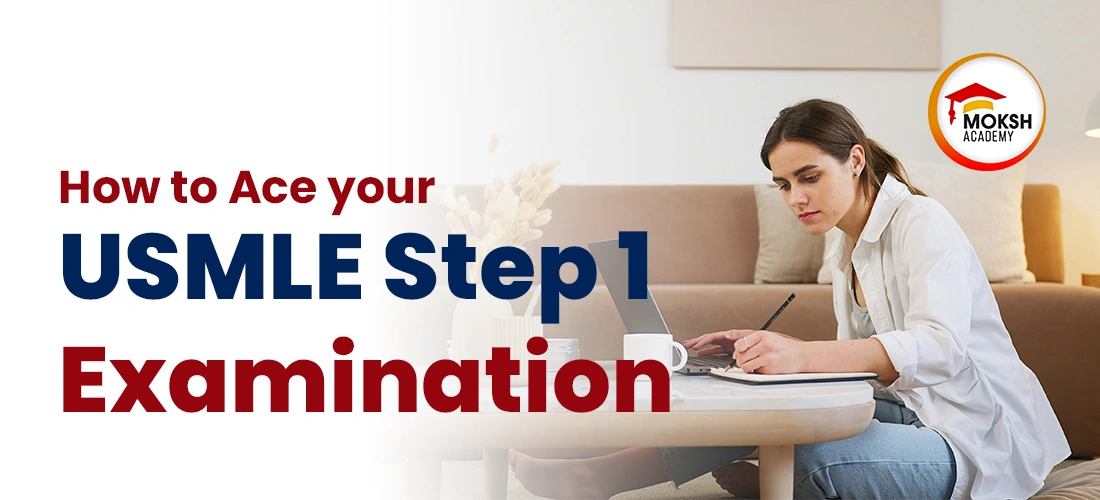
Introduction
Are you an International Medical Graduate (IMG) with dreams of securing a coveted spot in a USA medical residency program? The journey is challenging, but with the right preparation and strategy, you can not only compete with American medical students but also surpass them.
This guide is your roadmap to excel in the USMLE - United States Medical Licensing Examination Step 1 examination, a pivotal step on your path to a dream medical residency.
USMLE Step 1 Subjects
Being ready for the USMLE examination is crucial for aspiring doctors, and for that, it is necessary to know the USMLE subjects. To start USMLE Preparation, one needs to know what's on the test, and it can be understood by knowing all the subjects of USMLE Step 1. The exam covers various basic science subjects.
The USMLE Step 1 subjects are as follows -
- Anatomy
- Behavioural sciences
- Biochemistry
- Biostatistics and epidemiology
- Microbiology
- Pathology
- Pharmacology
- Physiology
- Genetics
- Aging
- Immunology
- Nutrition
- Molecular and cell biology
USMLE Step 1 Exam Overview
Understanding the USMLE Step 1 exam pattern is vital for success. The USMLE exam pattern is a crucial part to understand. The important points of the USMLE exam details are as follows -
- Step 1 is a one-day examination.
- It consists of seven blocks, each lasting 60 minutes.
- The number of questions per block can vary but won't exceed 40.
- The total number of questions for the entire exam won't exceed 280.
- There's a minimum of 45 minutes of break time included.
- Additionally, there's an optional 15-minute tutorial.
- If you finish a block of questions or the tutorial early, you can use that time for breaks.
- The exam is taken at a registered Prometric center.
Understanding USMLE Step 1 Content
The USMLE preparation is a very crucial part for aspiring physicians. But before doing USMLE Step 1 Preparation, one should know the USMLE Step 1 content.
- Step 1 evaluates your knowledge of basic medical sciences.
- It assesses your critical thinking and interpretation skills.
- The exam challenges you to apply your basic science knowledge to clinical problems.
- It demands patience, as it's an 8-hour-long examination.
USMLE Syllabus
Before starting USMLE preparation, it is important to understand the USMLE Syllabus. The USMLE Step 1 syllabus for Indian students consists of 18 core topics. These topics encompass fundamental concepts and principles related to organ systems and individual organs. You can refer to the USMLE Step 1 book to study these subjects. The USMLE Step 1 syllabus includes 8 distinct fields and 5 areas that combine multiple disciplines. Refer to the table below to understand the USMLE Exam syllabus.
| System |
Range |
| General Principles of Foundational Science |
15% – 20% |
| 1. Immune System |
60% – 70% |
| 2. Blood & Lymphoreticular System |
| 3. Behavioral Health |
| 4. Nervous System & Special Senses |
| 5. Skin & Subcutaneous Tissue |
| 6. Musculoskeletal System |
| 7. Cardiovascular System |
| 8. Respiratory System |
| 9. Gastrointestinal System |
| 10. Renal & Urinary System |
| 11. Pregnancy, Childbirth, & the Puerperium |
| 12. Female Reproductive & Breast |
| 13. Male Reproductive |
| 14. Endocrine System |
| 1. Multisystem Processes & Disorders |
15%– 20% |
| 2. Biostatistics & Epidemiology |
| 3. Population Health |
| 4. Social Sciences |
| Process |
Range |
| Normal Processes |
10% – 15% |
| Abnormal Processes |
55% – 60% |
| Principles of Therapeutics |
15% – 20% |
| Other |
10% – 15% |
Planning your USMLE Step 1 Timeline
After understanding the syllabus for USMLE, it is important to plan your USMLE step 1 timeline. When you're getting ready for the USMLE Step 1 exam, you need to plan your schedule carefully. It's like making a detailed map for your journey. You should set aside a good 6-8 months for your preparation. This gives you enough time to study properly, understand everything, and practice a lot. The USMLE exam timeline is very important to make.
Having this much time is like having a safety net. If unexpected things come up in your life or you find some topics really tough, you have extra time to handle them without feeling rushed.
Remember, USMLE preparation is more like a long-distance race than a sprint. So, take your time, make a good USMLE steps timeline, and stick to it. It'll make your journey to success on the USMLE Step 1 much smoother.
Things to know before USMLE Step 1
Before planning for the USMLE test, one needs to understand some very important concepts.
- Step 1 is more like a marathon than a sprint.
- Be ready for an 8-hour-long exam.
- Adjust your body clock to match the exam schedule.
- Get mentally strong for intense focus and stamina.
Best resources for USMLE Step 1
The USMLE Step 1 preparation needs fruitful USMLE resources. There are some USMLE resources for the foundation preparation. These are some of the Best USMLE resources, which are as follows -
- Utilize resources like Moksh live lectures and AMA sessions.
- Make use of the Learning Management System MOKSH, including study notes and tests.
- Solve UWorld questions in system-wise blocks of 40.
- Refer to First Aid USMLE.
- Create your flashcards and revision notes.
Studying methods is more crucial than studying content
It is evident that the USMLE test is very important and to qualify with good marks, every aspirant needs to study properly and sincerely.
- Create a designated, phone-free study zone.
- Use active recall.
- Apply the whiteboard technique.
- Teach concepts to others.
- Employ flashcards (try the ANKI app).
- Use Post-Its, to-do lists, and an accountability spreadsheet.
When to take NBMEs?
- First Mock: After the first round of UWorld
- Second Mock: After doing 50% of the Second pass of UWorld
- Third Mock: After the second pass of UWorld
- Weekly Mocks One month prior to the Exam Date
Revision Resources for the USMLE Step 1 Exam
The USMLE Step 1 preparation needs fruitful USMLE resources. There are some of the best USMLE resources for revision. These step 1 study resources are as follows -
- Utilize First Aid.
- Rework UWorld questions (second time, random, timed).
- Incorporate any other question banks.
- Study flashcards and notes.
When to book the exam slot?
Watch the results of a practice test so that you can know when to take your USMLE Step 1 exam. You want to book your exam when your scores are more or less to your desired target within a 15-point range. This ensures you're ready for the real test. Payment of the USMLE test cost will allow you to book a slot.
Regarding timing, it's wise to book your exam slot about five months before your planned test date. This early planning provides enough time to prepare without rushing and increases your chances of getting the date you want. This way, you can reduce stress and secure your preferred exam slot.
Preparation for the USMLE Step 1 Test Day
It would be so important for any Medical Aspirant to attempt the USMLE test. Before the USMLE test day, one should prepare for the USMLE Step 1 test day. The tips below will be very helpful.
- Practice by completing eight blocks of 40 questions each day from 8 a.m. to 5 p.m. for at least two weeks, with a designated weekly off day.
- Simulate exam conditions during your practice sessions.
- Plan your breaks.
- Keep your phone away.
- Allocate a break from 5 pm to 8 pm.
- Revise incorrect questions for an hour before sleeping.
On the Test Day of the USMLE Examination
Finally, after all the hard work, there will come a day when you have to attempt the USMLE Step 1 examination. The USMLE test day is very crucial, and it is important that you make the USMLE Step test day schedule. The USMLE Step 1 test day should be well managed. You can follow these measures below- step 1 test day tips
- Plan your journey to the test centre.
- Arrive 30 minutes before your testing appointment.
- Bring a jacket.
- Wear pocketless clothing.
- Carry your favourite snacks, protein bars, coffee, and energy drinks.
- Take a five-minute break after every block.
- Take off your spectacles each time you go out to take breaks.
- Celebrate at the end, regardless of the outcome.
By following these steps and staying dedicated to your goal, you can significantly increase your chances of achieving your USMLE Step 1 examination and securing a spot in a US medical residency program.
To Summarize
The USMLE Step 1 test is essential for an International medical graduate (IMG) seeking a medical residency in the US. The focus areas that are emphasized in this guide are thorough preparation, strategic planning, and efficient studying. It also underlines the importance of practice tests (NBMEs), the right time, and simulation of real exam experience. Passing Step 1 is the sign of commitment and the preparation for a successful future. All the best in your journey to success!




